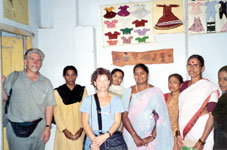Institute attempts to unite many faiths

Dr. William Kumbier, professor of English, Dr. Ree Wells, associate professor of sociology, and guide Raja Rajeswari (right center) visited workers at the Shankernager Peace Through Empowerment Center, where Hindu and Muslim women work together.
The Henry Martyn Institute was founded by a group of Christian missionaries in 1930 in Lahore, Pakistan.
Originally the aim of the Institute was to gain an understanding of Islam so the group could more easily complete its mission of conversion. Slowly, though, as the Catholic Church shifted toward opening up religious dialogues and away from evangelism, so did the HMI. By 1970, the Institute had settled in its current day home of Hyderabad.
Dr. Ree Wells and I, along with Dr. William Kumbier, had the pleasure of talking with the director and associate director of the HMI, Andreas and Diane D’Souza. The D’Souzas told us the HMI’s general aim is “reconciliation between people of different faiths and cultures.” To achieve this end, they support several ongoing programs of both community involvement and opportunities for academic study, to foster and encourage “the study of religions and practical grassroots involvement with the objective of improving relationships between divided groups and communities.”
A conflict resolution program is one ongoing effort by the HMI. This program involves establishing networks of skilled peace facilitators in Hyderabad and across India, so when problems arise, there are people in the immediate vicinity and community who have been trained in leadership and conflict resolution. To this end, the HMI works with local organizations interested in furthering peaceful resolutions. The Institute sponsors an annual workshop that aims at attracting people, both nationally and internationally, and many more workshops throughout the year for regional groups.
The peace through empowerment program is another of HMI’s ongoing efforts. Helping women from violence-prone areas of Hyderabad build job-related skills is a way to generate income and to provide a place Hindus and Muslims can frequently work together, enabling both groups to develop a better understanding of each other. A non-descript building with a small sign houses the Peace Through Empowerment Center in the poor neighborhood of Shankernager. The HMI chose this locality for the center because it is a violence-prone area where both Hindus and Muslims live.
The center is a place where Hindu and Muslim women work and learn side by side. At this center, women learn how to tailor clothes, read and write both Hindi and Urdu and help themselves and their center become self-sufficient. At the center, there is a careful effort to keep an equal ratio of Muslim and Hindu women and to create an environment conducive to working and learning together. On the walls are examples of different pieces of common Indian dress, such as the salwar kameez, kurtas and saris.
HMI project officer Raja Rajeswari explained the sewing machines the women used were either from the community, or HMI had lent money to the center so they could buy machines and pay HMI back once they were making clothes. Paying for the machines in this manner plays an important role in the women feeling pride in their work.
Much of the work they do is for local shops that sell “ready-made” clothes. Since the center is non-profit, the money made goes to buying more fabric and sewing machines and to pay the women a small stipend.
The money these women make creates new possibilities in life, for they no longer have to depend wholly on their husbands for income. They can buy new clothes for themselves or treat themselves to a meal; most importantly, perhaps, they are now contributing (in a way society readily understands) to their households.
The Shankernager community center provides a safe place where people of different backgrounds, with no other means of interaction, can work together and understand they are really not that different, no matter what politicians would have them believe. This net of safety and education a group of people created is a credit to the human spirit and the possibilities of peace and coexistence.
Your donation will support the student journalists of Missouri Southern State University. Your contribution will allow us to purchase equipment and cover our annual website hosting costs.



























